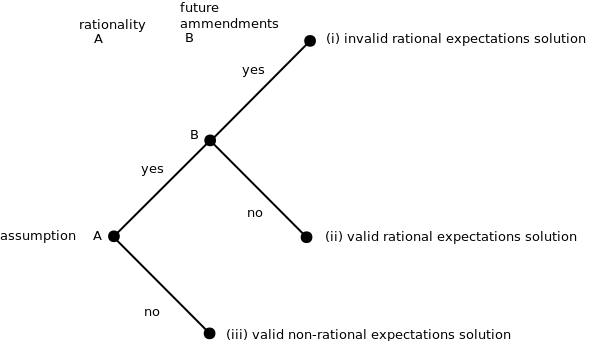COMMENT |
||||
|---|---|---|---|---|
 |
||||
© Christian Müller 2020 |
||||
| «home | Macroeconomic's model workhorse is not only «microfounded» but also «fully rational», or so mainstream's unique selling proposition reads. That means, among other things, that their economic model agent is bright enough to maximise today's utility over its whole future. Of course, such agent has no repercussions in reality and in fact, much has meanwhile been learnt about the empirical limits to full rationality. | |||
| That's fine, of course, but nothing has so far been learnt about the inherent, complete irrationality of the «fully rational» agent in the first place. | ||||
| Gabaix's (2020) AER paper is a point in case. There too, a «fully rational» agent optimises over the indefinite future without any difficulty. But there is a catch. Towards the end of the paper, Gabaix not only praises the huge step forward his model represents but also brags about the countless ways to further extend, amend, in short, «improve» his model. | ||||
| For some, as yet inexplicable reason, however, he fails to inform his «fully» rational agents about these future developments. | ||||
| The effect of this carelessnes is quite striking. In contrast to everyone else the bright agent is not aware of the fact that his (model) world is soon going to change due to the announced «improvements». Therefore, he keeps optimising in a world that, as everybody except himself well knows, soon no longer will exist. Sounds stupid? | ||||
| Just imagine Facebook's Zuckerberg ignoring the existence of Instagram because he does not listen to the news while everyone else does. Sounds stupid? You certainly have not difficulty to imagine where Facebook's share price would soon be. Gabaix, meanwhile, couldn't care less. In fact, despite this obvious irrationality, he insists on calling his dumb agent «fully» rational. | ||||
| To do justice to the author it has to be mentioned that the «microfounded rational expectations» model literature is littered with dumb agents such as his. High time, therefore, to ride to his rescue with a comment to his article which would let him shed the stupid label and safe the rest. But there is a catch. If you acknowledge the obvious stupidity of the «fully» rational agent you would also acknowledge the stupidity of the «rational expectations» modelling approach as a whole. | ||||
| To see why, let us go back to the initial task of optimising over the indefinite future. For being able to do so you would have to know every single event that may occur in one, two, three, ... all the years from now on and into the indefinite future. Sounds stupid? | ||||
| Yet even this stupidity could easily be rectified by simply assuming that the world is never going to change anymore. But there is a catch. Unfortunately, such an assumption would also close the door to all imaginable future extensions and «improvements» of the very model that you want to sell to your community. | ||||
| For the AER, therefore, all these inconveniences sum up to better never ever letting the word of the stupid agent see the light. Sounds stupid? Well, it is stupid! | ||||
Read the full story. |
||||
| Reference | ||||
| Gabaix, X. (2020). A Behavioral New Keynesian Model, American Economic Review 110(8): 2271 - 2327. | ||||
| Further reading | ||||
| Clearing Up the Fiscal Multiplier Morass: A comment | ||||
| Spooky neoclassics | ||||
| „Fukuyama models“ – a re-appraisal of the Lucas critique | ||||
| Uncertainty and Economics: A paradigmatic perspective, London and New York: Routledge | ||||
| «home | ||||
| © Christian Müller 2020 | ||||
| Jacobs University Bremen | ||||
| www.s-e-i.ch | ||||